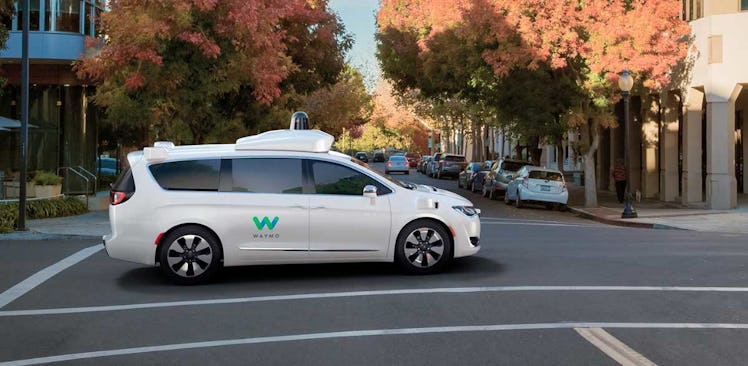Arizona’s Self-Driving Minivans Are Coming for Families
Google's parent company is talking about transportation, but it's bigger than that.

The self-driving car company Waymo, a Google spin-off, has announced that all adult residents of the greater Phoenix area are now eligible to sign up for test rides in the company’s self-driving minivans. The cost? Zero dollars. Alphabet, the parent company, is all about collecting data and the state of Arizona is all about minimal regulation, so Phoenix makes an ideal laboratory for testing one possible transportation future — a future that could fundamentally alter how family schedules and finances. And don’t think that Waymo doesn’t think in those terms: The company is explicitly marketing the free service to busy moms and dads.
RELATED: How I Learned to Love The Self-Driving Car
In the latest promotion for their self-driving program, Waymo highlighted a family avoiding the typical chaos of commuting thanks to a self-driving car. That marketing decision may be partially a product of the vehicles themselves, which are Chrysler Pacificas, and partially a product of Phoenix demographics, but it does indicate a long-term, family-centric strategy. That’s a no-brainer on multiple levels: Self-driving cars offer an opportunity for parents to spend quality time with their kids, for families to have access to more cars at lower cost, and, longer term, for kids to become more autonomous.
Arizona’s nearly complete lack of regulation on self-driving cars allows Waymo to test out a cutting-edge product and, if all goes well for the company, get comfortable with a robot behind the wheel. If families are convinced and more driverless car services are rolled out, the ramifications could be massive. Transportation researchers estimate that the rollout of self-driving cars “could reduce average ownership rates by 43%, from 2.1 to 1.2 vehicles per household.” This would save a lot of people a lot of money. The average car costs the owner almost $9,000 every year.
The question remains: Will the public hop into driverless minivans even after Waymo’s backup drivers step to the curb? Longer term, the answer is likely yes, but it could take time. A recent survey from AAA showed that the majority of Americans are still very uncomfortable with the prospect of giving up full control of driving. Almost three-quarters of those surveyed said they were afraid of being in a self-driving car. The sticking points seems to be giving up complete control of the vehicle. In the same survey, almost 60% of Americans said they were open to having autonomous features in their next vehicle. That may mean that Americans need a transitional generation of semi-autonomous cars to get fully comfortable with the idea of a driverless (and presumably ownerless) system.
This article was originally published on